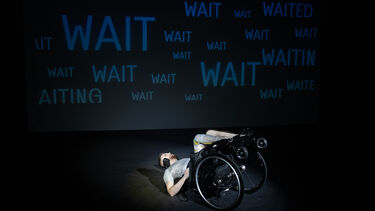Cripping time at a multitude of paces
By Jamie Hale
- This blog talks about “crip time”.
- Crip time is used to talk about the different ways disabled people experience time.
- It is often used to talk about working slowly or taking a lot of rest.
- In this blog the author talks about being neurodivergent and having a progressive condition and having nearly died in the past.
- They say that crip time for them is about resting and slowness.
- They say that for them crip time is also about doing things quickly while you can still do them.
- They argue that people should use the phrase “crip time” to talk about different experiences disabled people have of time.
- They say that it should include speed as well as slowness.
When we think about ‘cripping’ breath, we think about challenging ableist expectations of the normal breath and centring a wide range of disabled perspectives on breath and ventilation at the heart of our research. I often think about crip time, and how ‘cripping’ time requires us to hold a range of possible perspectives and understandings of what that might mean for our understanding of time and how we work.
Linear time is a complicated thing. It’s something one finds, and loses. I lost time, years of it, to doctors missing two easily treatable sequelae of my condition, and during that time, I lived on what I would now call ‘crip time’. Sometimes a half-hour conversation was exhausting for me, and I would need to sleep afterwards. I wasn’t working, and I had very few hobbies. My message replies to friends were fitted around my need for rest. I needed to rest to recover from resting to recover from… Well. Resting.
At that point in my life, living on crip time was a process of slowing. It reflected a need to look after myself, to respond to my body’s demands for rest. It also recognised that my responsibilities to others were also existing on a slower timeline - not just because of the rest I required, but because of the time cost of managing caregivers, medical care, supplies orders, and more.
This is what we often understand about crip time - that when we talk about it, we talk about slowness, and that disabled people have to live on a slower timeline, with more rest, and more self-care than is the case for non-disabled people.
What does that tell us about how we understand disability? And is that the whole of crip time? Should that phrase specifically reflect a process of slowing down, or should we be using it to understand that disabled people have different relationships to time, and exist on different timelines?
Whatever you might title my difference in learning - a difference, a disability, a divergence, there’s no doubting that it came with a certain speed, at least some of the time. I read faster than anyone I’ve ever met. When I am motivated to work - and this doesn’t always relate to whether I want to work - I hammer it out at a rattling pace. I focus on things for long periods, and emerge as if from underwater. The ability to do this comes with a flipside - I can’t estimate time, or project scope. I am rigid and fixed in how I do things. I cannot cope with change. But this difference makes me very fast - in a way that I can’t avoid. In a way that is crip. And it, too, defines my relationship with time.
I’ve come face to face with my own mortality on several occasions. I know that a chest infection would be very dangerous. I’m terrified of dying, and especially of dying before I’ve completed everything I plan to. And so, I drive myself fast, I work, I push. I don’t have the security of really expecting that I will necessarily have a long lifetime in which to do my work. If I want it done, I need to do it now. I have a sense of crip urgency. And this is not something that crip spaces are necessarily able to hold. Conversations about mortality are seen as too impairment-focused, too specific to an individual experience rather than a political one. And this means there’s never space to discover this side of crip time, because the environment in which we’d build that conversation is often closed down. Maybe other disabled people too, are afraid of talking about death.
My condition also means my energy levels are very variable. This means that I am sometimes existing on the timelines of what we typically understand of crip time - where things are done slowly, working from my bed and taking breaks in order to nap. But when I am well and can move quickly I do so - whether in my personal or work lives, and I’m on the other side of crip time. The restlessly quick one, driven by a relentless need to do things now.
Neither of these timelines meet with societal approval. To take time for self-care and be late with work, and to talk openly about prioritising what your bodymind needs - these things are often viewed as selfish and indulgent. But when you’re working at a pace, you’re criticised for being too prolific, doing too much, writing too much, showing people up, doing their jobs for them. Existing on this sped up time is seen as embedding bad and unhealthy working practices in the sector, modelling poor self-care.
But actually, if crip time is about responding to what our body-minds need, then crip-time can be fast as well as slow, crip-time can reflect neurodivergence in a multitude of ways, and it can be a battle against mortality, or a reflection of the need to make hay while the sun shines, and work while you can. And if we don’t acknowledge that, we continue with a framing that we, as disabled people, can only ever exist in that slowed up world that makes space for gentleness, rest, and care, without acknowledging that for some of us, gentleness and care can be expressed in a need to move quickly as well as slowly.
Working like this is a form of self-care for me. And I often feel pushed out of disability spaces, or like this is an illegitimate experience of crip time when I discuss it - often from people who aren’t engaged in the awareness of their own mortality that I have had to be. Can we not expand how we think of crip, and of crip time to encompass a range of experiences? To understand that speed is as much a need as slowness? To recognize that this is not a reflection of “hustle culture” but another facet of the excitingly diverse disabled experience? When we think about ‘cripping time’, can we give it the broad divergence that we do ‘cripping breath’ to encompass all of these perspectives?
To learn more about Jamie:


